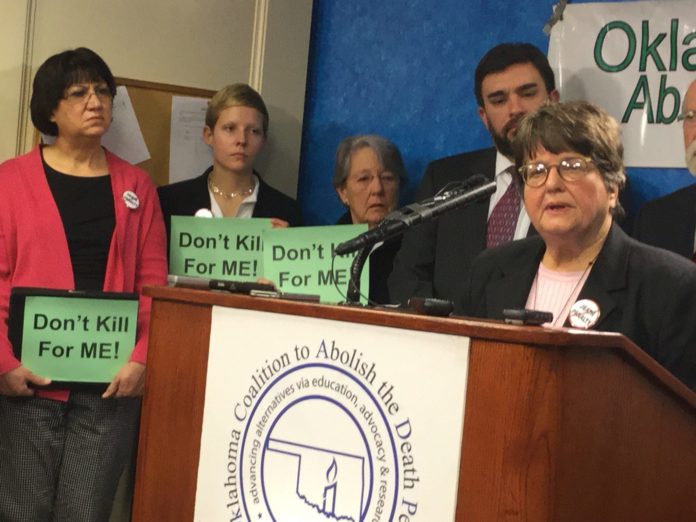Update 2 p.m., Jan. 28, 2015: The U.S. Supreme Court today ordered that three Oklahoma executions – including Richard Glossip’s scheduled for 6 p.m. Thursday – be postponed until the high court rules on a challenge to the state’s three-drug death cocktail.
SCOTUS is scheduled to hear arguments in the case in April. It is expected to render a decision by late June.
BY ARNOLD HAMILTON
 Fifty-five hours before Richard Glossip is scheduled to die by lethal injection, death penalty opponents – including Sister Helen Prejean – delivered petitions Tuesday with 30,000 signatures to Oklahoma Gov. Mary Fallin, urging she halt the execution.
Fifty-five hours before Richard Glossip is scheduled to die by lethal injection, death penalty opponents – including Sister Helen Prejean – delivered petitions Tuesday with 30,000 signatures to Oklahoma Gov. Mary Fallin, urging she halt the execution.
The petitions were presented one day after the state’s pro-death penalty attorney general, Scott Pruitt, asked the U.S. Supreme Court to postpone three upcoming executions – including Glossip’s – until justices rule on an inmate challenge that Oklahoma’s three-drug death cocktail violates the U.S. Constitution’s ban on cruel and unusual punishment.
Given Fallin’s pro-death penalty record, it’s doubtful she will be moved by the grass roots, international petition campaign to spare Glossip. A more intriguing question: will the Supreme Court act on Pruitt’s request before Glossip is strapped to the gurney at 6 p.m. Thursday at the Oklahoma State Penitentiary in McAlester?
Sadly, the justices waited until after Oklahoma executed Charles Warner on Jan. 15 to accept the inmates’ challenge to the state’s three-drug protocol – a lawsuit born of last spring’s botched execution of Clayton Lockett.
Sister Helen, author of Dead Man Walking and executive director of Ministry Against the Death Penalty, joined local religious and political leaders, social justice activists and Glossip’s attorneys in a mid-morning state Capitol news conference organized by the Oklahoma Coalition to Abolish the Death Penalty www.okcadp.org.
It was standing room only in the Capitol’s fourth-floor press conference room – not only death penalty foes, but also state, local and international media, underscoring the fact that Oklahoma’s damn-the-torpedoes approach to capital punishment is commanding widespread interest [and in many cases, scorn].
As the clock ticks towards Glossip’s scheduled execution, some important points on this week’s developments, not necessarily in order of significance:
- Even though witnesses said Warner betrayed no pain or discomfort during his execution, it’s clear that Oklahoma’s lethal-injection cocktail – particularly the drug used to render an inmate unconscious, midazolam – can be described accurately as human experimentation.
Oklahoma used midazolam for the first time in the bungled Lockett execution – he died of a heart attack after the lethal procedure was called off. So, when it executed Warner, the state increased the amount of midazolam five-fold.
Florida has apparently used midazolam without incident, but Arizona and Ohio – which had problems with executions involving midazolam and another drug – announced they would not again use the mixture.
Such mixed reviews could give a conservative U.S. Supreme Court pause.
- Pruitt’s request that SCOTUS delay three Oklahoma executions until it rules on the inmates’ lawsuit was good politics and good public policy.
It was good politics because it somewhat inoculates Pruitt from criticism he is a bloodthirsty ideologue who cares nothing about fairness, only revenge. It was good public policy because – if the justices grant his request – the state’s execution protocol should receive a thorough review by the nation’s highest court which then will deem it fair or foul.
- Speaking of fairness, Glossip’s case illustrates that the death penalty often isn’t applied fairly and evenly.
Glossip wasn’t even present when the murder for which he was convicted occurred. Justin Sneed, who delivered the fatal beating to Barry Van Treese, was given a life-without-parole sentence after he agreed to testify that Glossip offered him $10,000 to kill Van Treese. Glossip proclaimed his innocence and refused to accept a plea deal that would have given him the possibility of parole in 20 years.
Now he faces lethal injection, while Sneed lives out his life in a medium-security Oklahoma prison.
- These numbers are worth noting: 150 death row inmates nationally – including 10 in Oklahoma – have escaped society’s ultimate punishment after post-conviction/post-sentencing investigations proved their innocence.
There is no way to undo a death sentence.
- Finally, it costs taxpayers a lot of money to be punitive – precious resources that could be applied to public services with far more societal value like education, mental health care or roads and bridges.
In Kansas, for example, the defense in death penalty trials costs an average $400,000 per case – four times as much as when capital punishment is not sought, according to a 2014 study. In California, death penalty cases cost the state over $4 billion between 1978-2011. And in Florida, enforcing the death penalty costs $51 million more annually than punishing first-degree murderers with life in prison without parole [2000 report].
Rather that searching for creative execution protocols, Oklahoma lawmakers – and taxpayers – would be far better off seriously considering this question: Is the death penalty a deterrent?
Overwhelming evidence suggests it is not. Most capital offenses are heat-of-the-moment, the perpetrators in full drug and/or alcohol stupor. A driver in full road rage doesn’t pause to consider the consequences of pulling the trigger.
Even more intriguing, FBI data suggests a link between murder and execution rates. States where the death penalty is pursued more often tend to experience higher murder rates.
For more analysis and commentary on Oklahoma’s dubious execution protocols, see the February Observer, available in retail outlets the week of Feb. 9 and on-line for digital subscribers on Feb. 5.
– Arnold Hamilton is editor of The Oklahoma Observer
Photo: Sister Helen Prejean flanked by ACLU Counsel Brady Henderson and death penalty opponents at Jan. 27 state Capitol news conference.








